174 Search Results for prompt
April 25, 2013
by Carole Zangari -
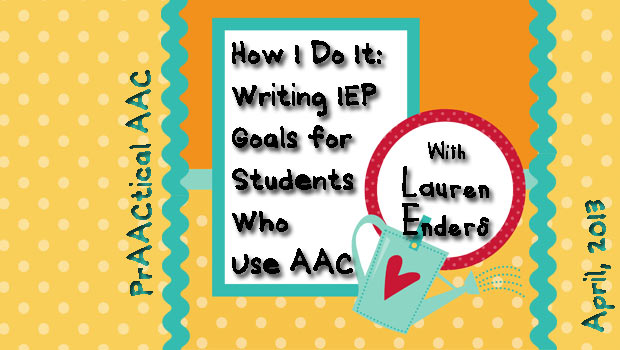
We’re so happy to welcome Lauren Enders back to share some more thoughts on AAC and the IEP. In her first post on this topic, Lauren addressed some frequently asked questions. Today, she provides a very valuable perspective on writing IEP goals for students who use or need AAC and some wonderful resources. Very often, I receive requests for support from teachers and speech therapists that are writing IEP goals for their students who use AAC. When we sit down to discuss their questions, the first thing I remind them is that AAC goals are no different from any other IEP goal. I recall a workshop I attended years ago presented by Gail VanTatenhove that helps put IEP goals for AAC into perspective. Gail said that AAC therapy is just language therapy. Isn’t that true? Aren’t we just teaching language? For this student, language is simply being expressed in a... [Read More...]
April 13, 2013
by Robin Parker -
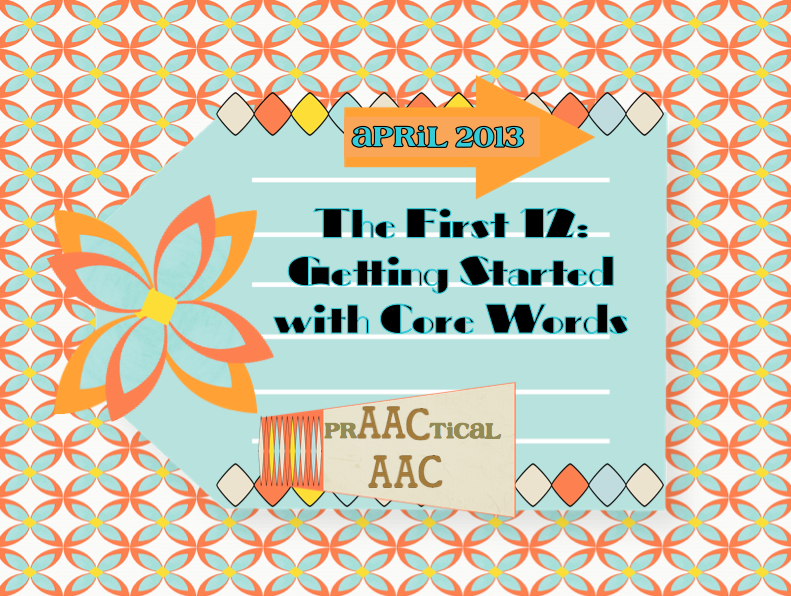
The focus this month is on core word vocabulary and effective teaching strategies. Most core vocabulary is represented through abstract symbols that range from translucent (i.e., makes sense after it is explained) to opaque (i.e., doesn’t have any resemblance to the word or concept) which makes the need for effective teaching all the more important. It also makes it more fun because meaningful language experiences, emotional language experiences, and repetition with variety experiences are going to be the platform for teaching. Within the platform of authentic language experiences, layers of teaching strategies can be applied. The more strategies we apply to learning, the more we assure ALL learners will benefit from our teaching. Core word vocabulary teaching begins with a few premises that underlie the process. These are not new ideas but ones that should be reaffirmed as you begin teaching. It is important, as always, to presume competence. All learners... [Read More...]
April 11, 2013
by Carole Zangari -
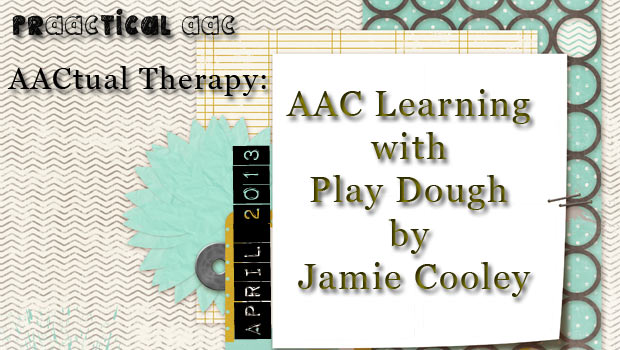
Today, we’re happy to introduce you to another AACtual Therapist, Jamie Cooley, the SLP for Belpre City Schools (belpre.k12.oh.us), located in Belpre, OH. She is a graduate of Ohio University (B.S. ’09, M.A. ’11) and currently resides in Athens, OH. Jamie did work at Ohio University focusing on AAC and children with autism under the instruction of Dr. John McCarthy and Dr. Joann Benigno. She has worked for Belpre City Schools for two years with students in grades K-12. In this post, Jamie uses a case study approach to share a lesson using Play Dough. Background Emma is a third grade student. She was born with hypoplastic left heart syndrome, and her cognitive and communication skills are significantly below age-norms. She receives most of her academic instruction in a resource room. Communicatively, Emma repeats many words and phrases, and combines up to two words on her own. This is... [Read More...]
April 4, 2013
by Carole Zangari -
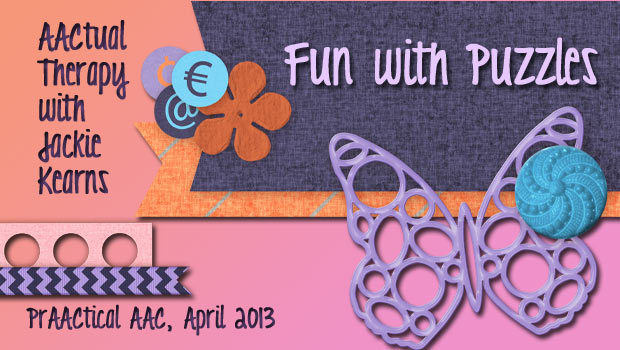
Today, we’re pleased to introduce SLP Jackie Kearns, coordinator of the Technology Resource Center at the Cleveland Clinic Children’s Hospital for Rehabilitation. Prior to that, she received her bachelor’s and master’s degrees from Ohio University. She completed both an undergraduate and graduate level thesis and has published in Contemporary Issues in Communication Sciences and Disorders. Jackie has over 5 years’ experience working with medically complex children in both inpatient and outpatient hospital settings. She has provided numerous AAC evaluations and treatment for children ranging from 1-21 years of age. In addition, she has done numerous presentations and in-services for staff at the Cleveland Clinic. We’re grateful to Jackie’s AAC professor and mentor, Dr. John McCarthy for recommending her to us. Therapy Activity: Fun with Puzzles Intended audience: Early intervention, preschool aged children, and/or emergent AAC communicators Type(s) of AAC: Eye gaze, reaching Picture communication symbols Single message voice output communication... [Read More...]
March 30, 2013
by Carole Zangari -
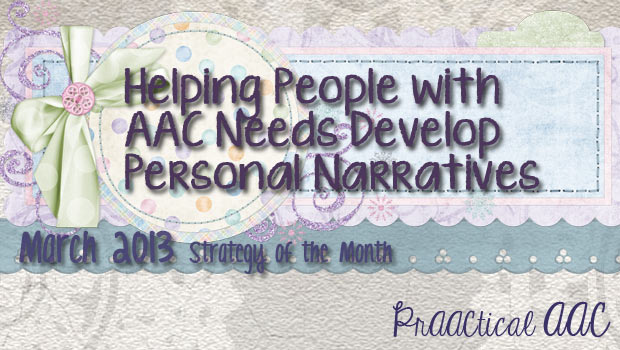
Where I come from, we value our independence. We look forward to the day when we can move out of our childhood homes into our first apartments. We’re intensely proud of our kids when they first do things on their own. We feel honored do to our first professional presentations or fly solo on a publication. We are driven to be independent in our professional and personal lives. Independence is all well and good, but sometimes we get caught up in thinking that it’s the most important thing for our clients who use AAC. Many times, it’s not. As SLPs well know, communication is a social act. Without the cooperation of another person, there is no communication.We need other people in order to communicate and we need them even more when we’re just learning. Independence is something, but it isn’t everything. For AAC learners, interdependence plays an important role. We love... [Read More...]
March 16, 2013
by Carole Zangari -
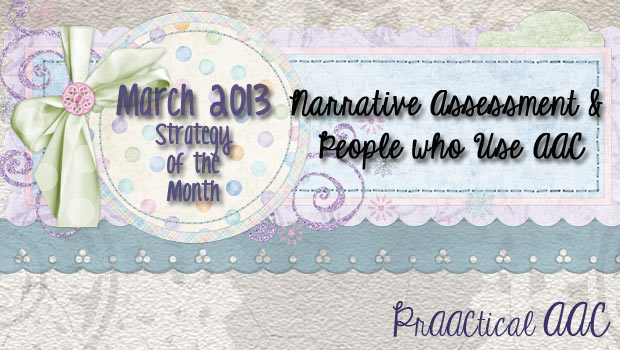
This month, we’ve been talking about building narrative skills in our AAC clients. We tried to build the case that including narrative language goals in our intervention allows us to help people who use AAC to participate more fully in social exchanges, relay more in-depth information, and achieve greater academic success. But how do we know where to start in narrative intervention? And how do we measure progress? In this post, we share some thoughts on the assessment of narrative language in AAC. Most test batteries that assess narrative language are designed to take a snapshot of what the learner has already mastered in terms of telling personal narratives, story retelling, or scripts. This allows us to look beyond MLU, morphology, and grammar and can be useful in determining whether intervention is needed. Some scholars, however, have noted the limitations of this “one shot” approach, particularly for learners whose communication... [Read More...]
March 9, 2013
by Robin Parker -
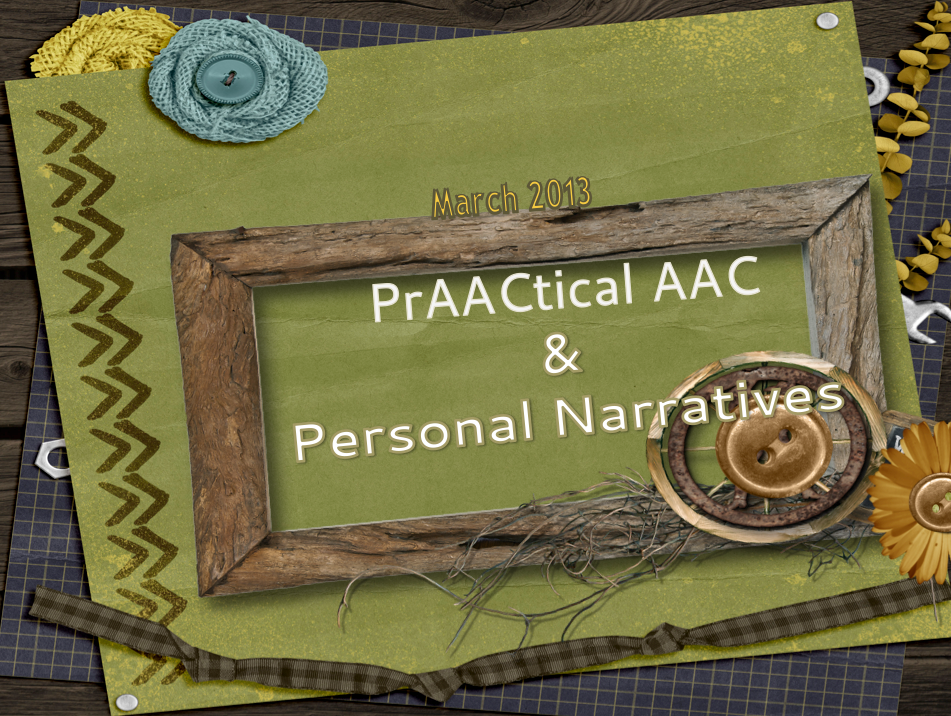
Personal narratives are the first story skills that develop. They tell about ourselves and our connection to activities, places, and events. They tell about how we feel about people and experiences. Personal narratives help us structure and organize the events of our lives and even become a way of thinking about ourselves and our identities. We know many AAC users have significant difficulty with narratives. We always wonder though, is it a function of language difficulty or of access, exposure, and PrAACtice or more likely a combination. There are key intervention strategies that help AAC learners be able to tell personal narratives. You probably won’t be surprised by what strategies work but the research from Gloria Soto and colleagues has shown us that when applied to personal narratives, AAC users can be competent story tellers. Some Thoughts on Personal Narrative Assessment Even before assessment of the AAC learner, in all fairness,... [Read More...]
March 1, 2013
by Robin Parker -
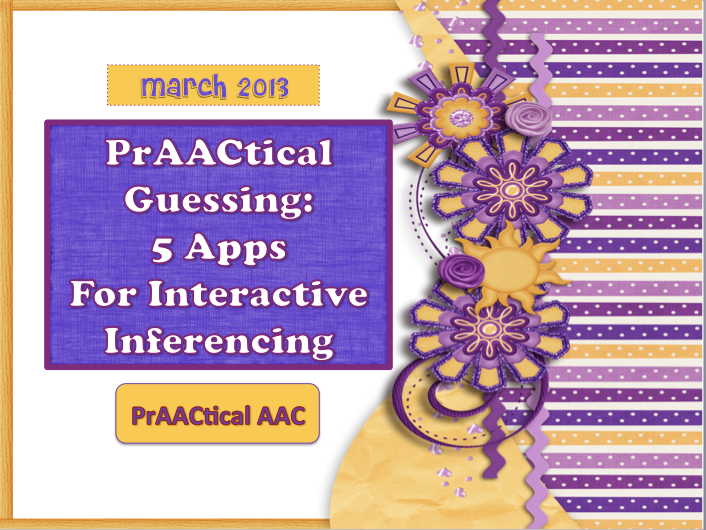
We have been writing and talking about AAC & language strategies that go beyond requesting. And although we start a new month (today) and a new strategy on Saturday, we wanted to close this last day of the work week with a fun way of focusing on a complex but important language skill for ALL learners. If we presume competence, teach, model, and provide activities that are fun and have a variety of response options then everyone can learn to make ‘educated’ guesses and be able to ‘explain’ their choices. There is a difference in making the correct choice and explaining how you made the choice. This skill of guessing is called inferencing. Inferencing is the process by which a conclusion is inferred from an observation or multiple observations. The conclusion may be correct or incorrect, but conclusions are based on information we have at the time. As a language... [Read More...]
February 23, 2013
by Robin Parker -
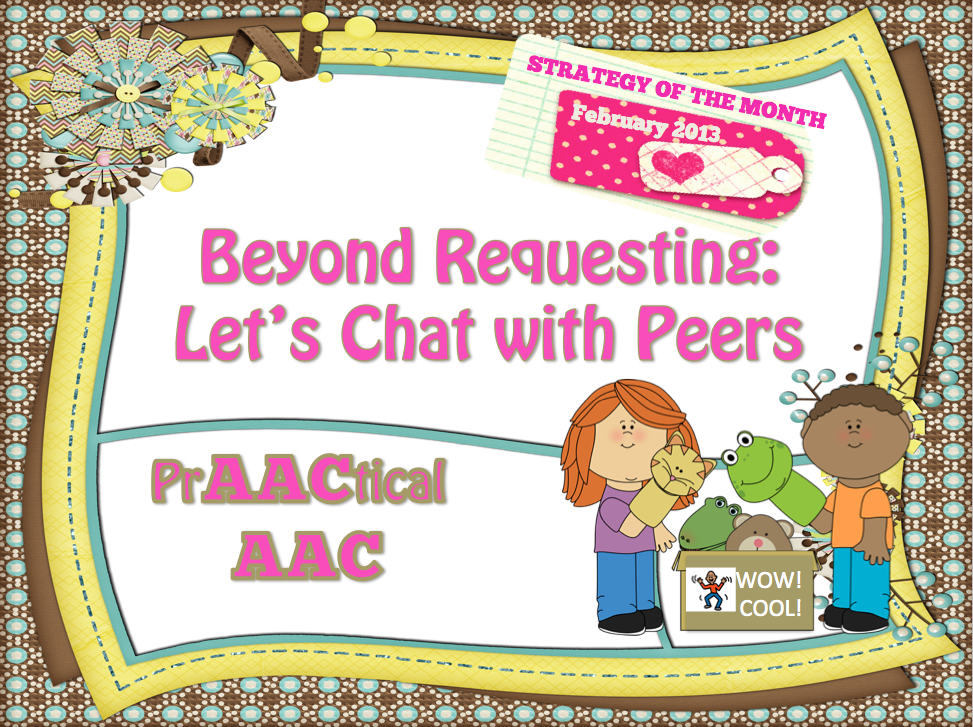
As we wrap up the February Strategy of the Month, we need to add strategies for helping AAC users talk/chat with peers. For some learners, it is more about providing access and opportunity while for others, it is more about providing a platform for the social awareness and exchange. However, for all learners who need assistance in ‘chatting’, there are many goals and strategies that will help. Setting the Foundation for Social Exchanges with Peers Provide frequent opportunities for peers to communicate with each other- Build in many opportunities within all (or almost all) activities for generic small talk, gossiping, & chatting. Create activities that have’ built in’ communication with peers- develop activities that require communication with peers to make the activity work. Instead of having all communication directed at the adults/facilitators in the room, have the learners talk to peers to take steps in the activity. Set up... [Read More...]
February 14, 2013
by Carole Zangari -
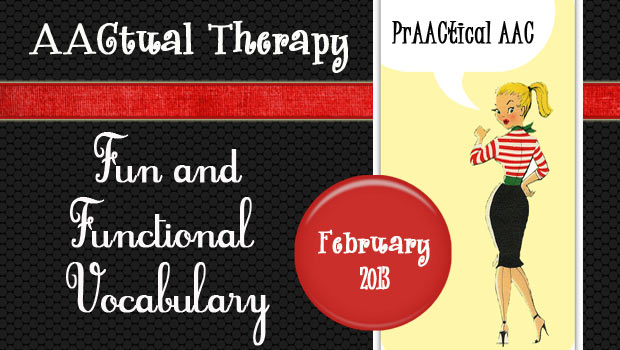
We are delighted to have Shareka Bentham back to share another post about the AACtual therapy she provides to little ones in Barbados. Last month, we followed her along to the zoo where her little friends got to generalize the language skills developed in therapy sessions. In this post, Shareka discusses her approach to something we all struggle with: selecting vocabulary that will both fun and functional. One of my biggest challenges in AAC is choosing good vocabulary targets, and working on vocabulary instruction for early communicators. By ‘good’ I mean targets which are functional for their everyday settings, representative, and most of all fun for children who are not only beginning communicators, but also beginning AAC users. I have become the AAC ‘specialist’ at a school for children with complex communication needs, so I generally have to cater to the communicative needs of children from the pre-communication to... [Read More...]









